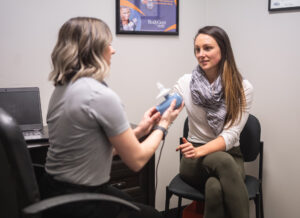
Customization is the key to hitting your health and wellness goals. Nutritional plans need to be created to address a client’s specific needs. Estimating a client’s caloric needs can lead to inaccuracy when creating meal plans and setting goals. Metabolic testing is one tool we can utilize when creating customized nutritional plans. It calculates caloric needs specifically to the individual. Anyone can benefit from knowing his or her basal metabolic rate (BMR), but athletes, weight loss, weight maintenance, weight gain and polypharmacy clients might find it the most useful. So what is metabolic testing? Below, we will explore common questions clients have about metabolic testing.
Why is metabolic testing important?
Metabolic testing determines the amount of calories a client needs to properly fuel his or her body. Metabolic testing will account for changes in your metabolism related to illness or disease, medications, genetics and weight change. This makes it a more desirable and accurate method of determining caloric needs versus predictive equations.
 What factors can affect metabolism?
What factors can affect metabolism?
Many factors can affect metabolism. Some of these include body mass, body composition, age, gender, hormones, medications, nicotine, stress and nutritional supplements. Studies have shown that individuals having similar physical characteristics can differ significantly in caloric needs. Caloric needs may differ from one person to another up to 900 calories per day.
What determines an individual’s caloric needs?
An individual’s energy needs are based on three metabolism components: basal metabolic rate (BMR), thermogenic effect of food (TEF) and activity thermogenesis. Your BMR accounts for the largest component of your daily energy expenditure, comprising 60-75 percent of your metabolism. This includes involuntary bodily processes such as organ function. While the brain, liver, GI tract, heart and kidneys make up less than 5 percent of body weight, they alone account for approximately 60 percent of your BMR. Additional energy is needed for other bodily functions, such as digestion, absorption and metabolism of food, also known as the thermogenic effect of food. TEF is close to 10 percent of the metabolic rate but can vary based on one’s diet. Inefficient digestion and absorption can play a role in obesity. The third and most variable component of metabolism is activity thermogenesis. This is your daily physical activity and exercise, which generally accounts for 20-40 percent of your metabolic rate. By adding all three components together, a dietitian can determine an individual’s caloric needs.
How do dietitians determine an individual’s caloric needs?
 Registered dietitians can calculate an individual’s caloric needs with indirect calorimetry. Indirect calorimetry is the measurement of gasses during respiration. The respiratory quotient CO2/O2 is then used to estimate needs over a 24-hour period. If metabolic testing is not available, a predictive equation can be used. Mifflin-St. Joer is a validated equation for healthy, normal weight and moderately overweight men and women. It is important to note that indirect calorimetry is the gold standard for determining one’s needs.
Registered dietitians can calculate an individual’s caloric needs with indirect calorimetry. Indirect calorimetry is the measurement of gasses during respiration. The respiratory quotient CO2/O2 is then used to estimate needs over a 24-hour period. If metabolic testing is not available, a predictive equation can be used. Mifflin-St. Joer is a validated equation for healthy, normal weight and moderately overweight men and women. It is important to note that indirect calorimetry is the gold standard for determining one’s needs.
What to expect when metabolic testing.
Metabolic testing is quick and easy and can be completed in an office setting. I describe it to my clients as being similar to snorkeling. You will be asked to breathe for approximately 10 minutes into a mouthpiece connected to a metabolic machine. To ensure proper air flow, you will need to wear a nose clamp. For the most accurate results, your dietitian will require you to fast from eating, caffeine, exercise and over-the-counter medications four hours prior to testing. The best part about metabolic testing is that your results are immediate. You will be able to review results with your dietitian once the test is complete.
How often should I take a metabolic test?
As a general rule of thumb, it is suggested to metabolic test with every 10-15 pounds of weight change.
To schedule a metabolic testing session with a Nutrition Healthworks dietitian, please call 704-380-4655.
- al et, Brown JE. Nutrition through the Life Cycle. Belmont, CA: Wadsworth; 2011.
- Danforth, E., Jr., Dietary-induced thermogenisis: control of energy expenditure. Life Sci, 1981. 28(15-16): p. 1821-7. 2
